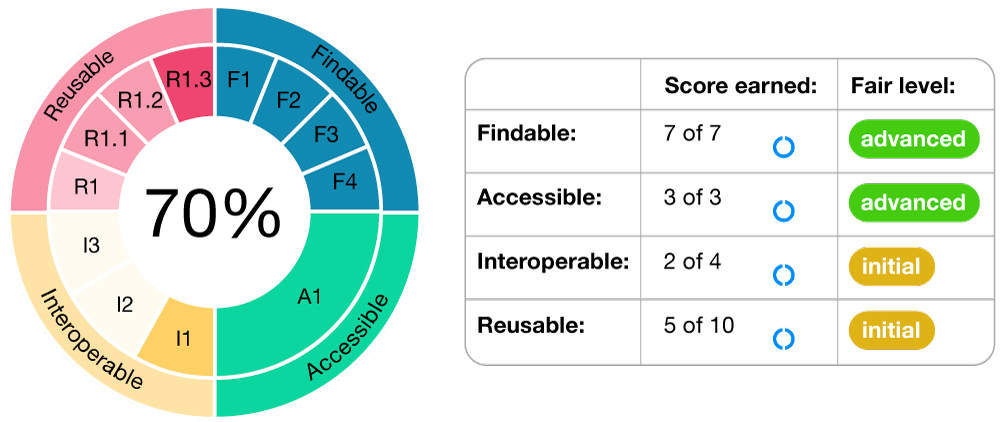The Copernicus Climate Data Store (CDS) and Atmosphere Data Store (ADS) provide a vast array of information from the EU’s Copernicus Climate Change Service (C3S) and Atmosphere Monitoring Service (CAMS) run by ECMWF. The CDS can be found at https://cds.climate.copernicus.eu/, and the ADS at https://ads.atmosphere.copernicus.eu/. The two Data Stores have recently been developed with a strong emphasis on ensuring that our digital assets fully adhere to the FAIR principles – making them Findable, Accessible, Interoperable, and Reusable (https://www.go-fair.org/). This transformation is not only a technical upgrade; it represents a strategic step toward maximising the impact of our data catalogues and serving a broader and more diverse user community. ECMWF is not only enhancing climate and atmospheric data accessibility for researchers and policymakers but also laying the groundwork to support the next generation of machine learning weather and climate applications and European-wide federated data platforms.
Achieving a new benchmark in FAIR compliance
According to our recent FAIR assessment, our modernised data catalogues have achieved an impressive 70% FAIR score as measured by the FAIRsFAIR F‑UJI assessment tool (see an example in the figure). The tool is a European Open Science Cloud initiative to assess the FAIRness of digital assets (https://fairsfair.eu/fairsfair-eosc). This score is a marked improvement in comparison to previous assessments, underlining the success of our efforts to implement modern data management strategies. The assessment highlights four findings:
- Findability: Each catalogue entry is now assigned a persistent Digital Object Identifier (DOI) registered with Datacite, ensuring that every dataset and its accompanying metadata remain uniquely locatable over time.
- Accessibility: The introduction of a STAC-compliant metadata API means that both human users and machines can now query catalogue metadata programmatically, significantly enhancing data discoverability and accessibility (https://stacspec.org/en).
- Interoperability: By also adopting the Open Geospatial Consortium (OGC) API - Records, we are better aligned with other European and global data-sharing infrastructures. This facilitates seamless integration and cross-referencing (https://ogcapi.ogc.org/records/).
- Reusability: Our plan to move towards using standard open licences (e.g. Creative Commons licences, CC BY) and the provision of richer, well‐documented metadata now enable users to confidently reuse our data, generating new knowledge and increasing the impact value of the open data provided by the Data Stores.

Standardisation: a catalyst for integration and innovation
Standardisation plays a pivotal role in the modernisation drive around the Data Stores. By aligning our data catalogues with internationally recognised standards, we ensure that our datasets are not only high quality but also readily consumable across a variety of platforms and applications. This is particularly important in an era where machine learning and artificial intelligence increasingly harvest large, standardised, datasets to drive innovation. As part of ECMWF’s data services strategy, we have created a centralised, automated method for exposing metadata, enabling us to quickly update records with minimal intervention and onboard new metadata standards or adjust to evolving ones.
These improvements are instrumental in supporting an integrated data-sharing ecosystem that aligns with broader European Union initiatives and the European Open Science Cloud, highlighting ECMWF’s role in supporting Europe’s digital and green transitions.
What next?
Whilst we are pleased with our progress so far, we recognise that this is a step on a longer journey toward optimal FAIR compliance. Future work will focus on:
- Enriching metadata: Further refining our metadata to provide detailed data provenance and using consistent controlled vocabulary.
- Strengthening interoperability: Enhancing links between our catalogues and external resources to boost overall data integration.
- Improving reusability: Transitioning more datasets to standard open licences like CC BY to maximise their reuse and increase their social and economic impact for the public.
Explore our catalogues’ FAIRness assessment
With fairer weather accompanying this spring edition of the ECMWF Newsletter, we invite you to assess our FAIRer catalogue. Simply visit the FAIRsFAIR F‑UJI assessment page (https://www.f-uji.net/) and enter one of our catalogue DOIs (for example, https://doi.org/10.24381/cds.bd0915c6 for ERA5 hourly data on pressure levels) to see our progress for yourself.
Are you interested in learning more? We hosted a webinar featuring external expert Dr Ge Peng from the University of Alabama. She presented her insights gained from assessing the FAIR compliance of NASA Earth science data products and also provided an overview of existing tools used for evaluating data FAIRness. You can re‑listen to the excellent talk via our website (https://events.ecmwf.int/event/471/).
